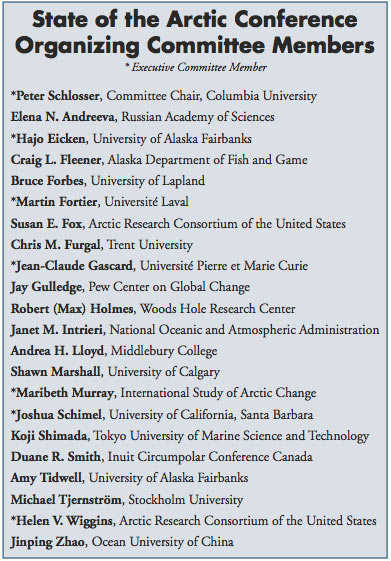The State of the Arctic Conference, to be held 16–19 March 2010 in Miami, Florida, will be a major milestone for arctic science, providing an international forum to review current knowledge of the arctic system in a time of rapid environmental change and point to future research, resource management, and policy directions. Participants will include a diverse and interdisciplinary group of scientists, students, agency personnel, policy makers, stakeholders, northern representatives, and media. Over 200 talks and two poster sessions will cover all aspects of arctic change, including sea ice, atmosphere, marine mammals and fisheries, vegetation, geopolitics and international relations, resource management, impacts on local communities, connections to lower latitudes, and many others.
<p class="body-text">Detailed information about the event can be found on the conference website at: <a href="" title="State of the Arctic2010">http://soa.arcus.org</a>.</p>
<h3>Conference Program</h3>
<p class="no-indent">The State of the Arctic Conference program has been structured to facilitate cross-disciplinary exchange and discussion. Keynote speakers for the event currently include:</p>
<ul>
<li>Arden Bement, Director of the National Science Foundation (NSF); </li>
<li>Jane Lubchenco, Under Secretary of Commerce for Oceans and Atmosphere and Administrator of the National Oceanic and Atmospheric Administration (NOAA); </li>
<li>Vera Metcalf, Director of the Eskimo Walrus Commission; </li>
<li>Senator Lisa Murkowski (Alaska); </li>
<li>Marianne Lykke Thomsen, Senior Policy Advisor of the Greenland Department of Foreign Affairs and Senior Arctic Official of the Arctic Council; </li>
<li>Mead Treadwell, Chair of the U.S. Arctic Research Commission (USARC); and</li>
<li>Wendy Watson-Wright, Assistant Director General of the United Nations Educational, Scientific, and Cultural Organization (UNESCO).</li>
</ul>
<p class="body-text">Sessions are organized by four main themes:</p>
<ul>
<li><strong>Advances in arctic system understanding</strong>. Presentations will concentrate on basic functioning of the arctic system, including human dimensions, progress in observing and understanding components of the arctic system, and limitations of present study methods. Keynote speakers for this theme include Andrea Lloyd (Middlebury College) and Maribeth Murray (International Study of Arctic Change).</li>
<li><strong>Arctic change</strong>. Presentations will focus on rapid, system-scale changes and our capability to project future states of the arctic system under various scenarios. Keynote speakers for this theme include Louis Fortier (Université Laval and ArcticNet) and Duane Smith (Inuit Circumpolar Council Canada).</li>
<li><strong>Linkages to the Earth system</strong>. Presentations will cover linkages and feedbacks between the arctic system and the Earth system. Keynote speakers for this theme include John Walsh (International Arctic Research Center) and Oran Young (University of California Santa Barbara). </li>
<li><strong>Translating research into solutions</strong>. Presentations will address informed solutions to problems caused by environmental change, including establishing priorities for mitigation and adaption and evaluating solutions, new and innovative approaches to the communication of scientific information about arctic change to stakeholders, and the interface of science and policy. Keynote speakers for this theme include Robert W. Corell (Arctic Climate Impact Assessment and Climate Action Initiative) and Elke Weber (Center for Research on Environmental Decisions at Columbia University). An international panel will explore issues on intersections between science and policy in a changing arctic.</li>
</ul>

<p class="body-text">The conference will also feature a presentation by the Pavva Iñupiaq Dancers of Fairbanks, Alaska, which was formed to preserve and interpret the culture and traditions of the Iñupiat peoples of the arctic region through song and dance. </p>
<p class="body-text">The fourth day (Friday, 19 March) of the conference will focus on international collaboration in arctic research. It is organized around a series of plenary talks outlining the science reliant on future international collaborations, a review of several arctic research programs and projects, and an international agency panel discussion. Plenary sessions will be broadcast live via the conference website to allow for “virtual” participation.</p>
<h3>Student Involvement</h3>
<p class="no-indent">The State of the Arctic conference offers an exciting program to engage and support students at the event. In addition to 25 student travel awards, students will participate in a mentoring program, a “Conversation with Scientists” special luncheon, and a workshop presented by Susan Buhr, Cooperative Institute for Research in Environmental Sciences (CIRES), on effectively communicating climate change science.</p>
<h3>Conference Sponsors</h3>
<p class="no-indent">The State of the Arctic Conference was conceived and developed by the interagency Study of Environmental Arctic Change (SEARCH) and NSF Arctic System Science (ARCSS) Program communities—major funding is provided by the NSF Division of Arctic Sciences. Other sponsors of the conference include the National Oceanic and Atmospheric Administration (NOAA), International Arctic Systems for Observing the Atmosphere (IASOA), U.S. Arctic Research Commission (USARC), North Slope Science Initiative (NSSI), International Arctic Science Committee (IASC), Arctic Ocean Sciences Board (AOSB), Alaska Ocean Observing System (AOOS), U.S. Department of Energy (DOE), National Aeronautics and Space Administration (NASA), and World Wildlife Fund (WWF).</p>
<p class="body-text">The Arctic Research Consortium of the U.S. (ARCUS) is organizing the conference on behalf of the arctic community and sponsoring organizations. Active partners in conference planning include the International Study of Arctic Change (ISAC), ArcticNet, and Developing Arctic Modeling and Observing Capabilities for Long-term Environmental Studies (DAMOCLES). </p>
<p class="body-text">For more information on the State of the Arctic Conference, go to <span class="urls-pantone">http://soa.arcus.org</span>, or contact Helen Wiggins, Director of Programs at ARCUS (helen [at] arcus.org).</p>
